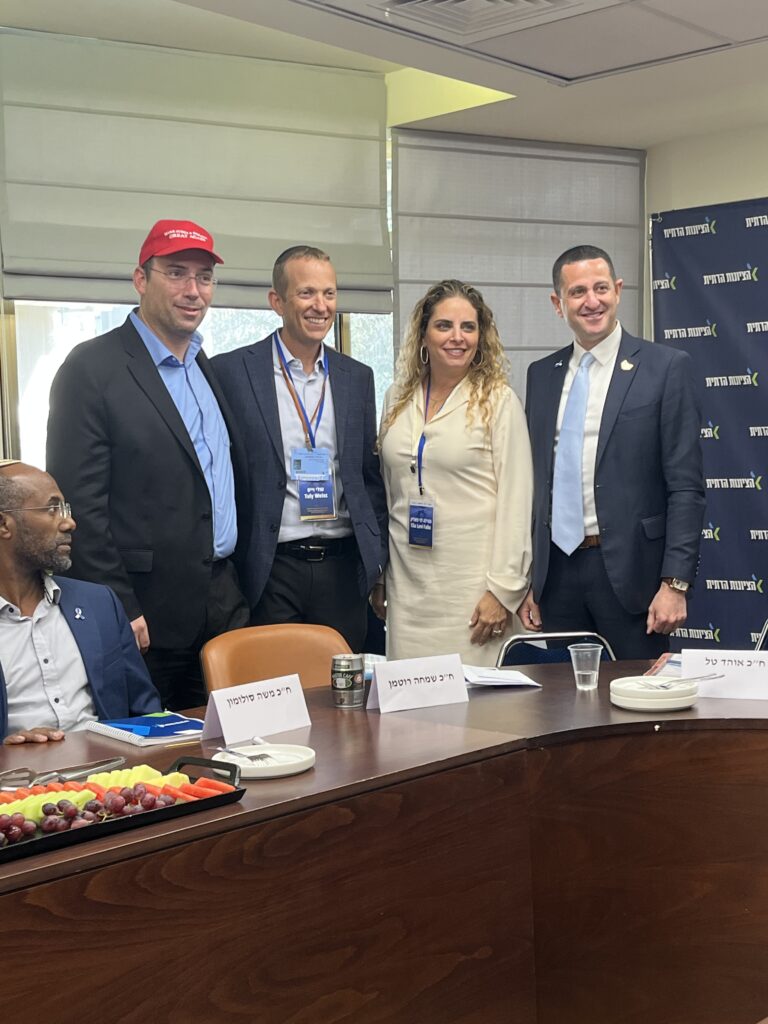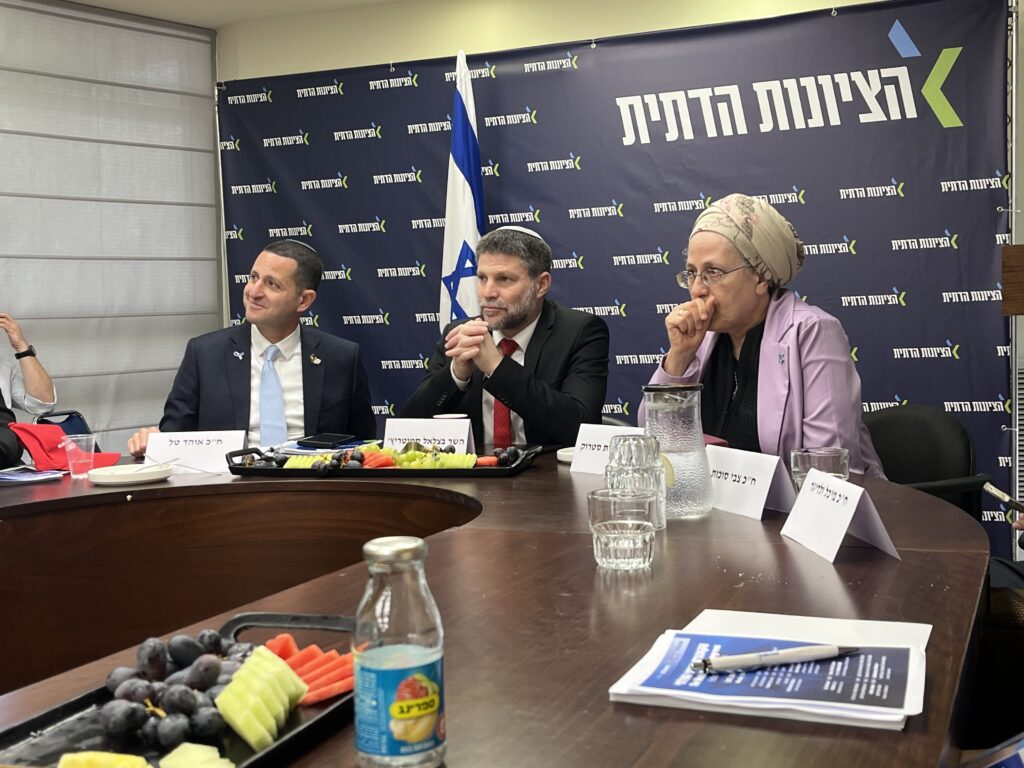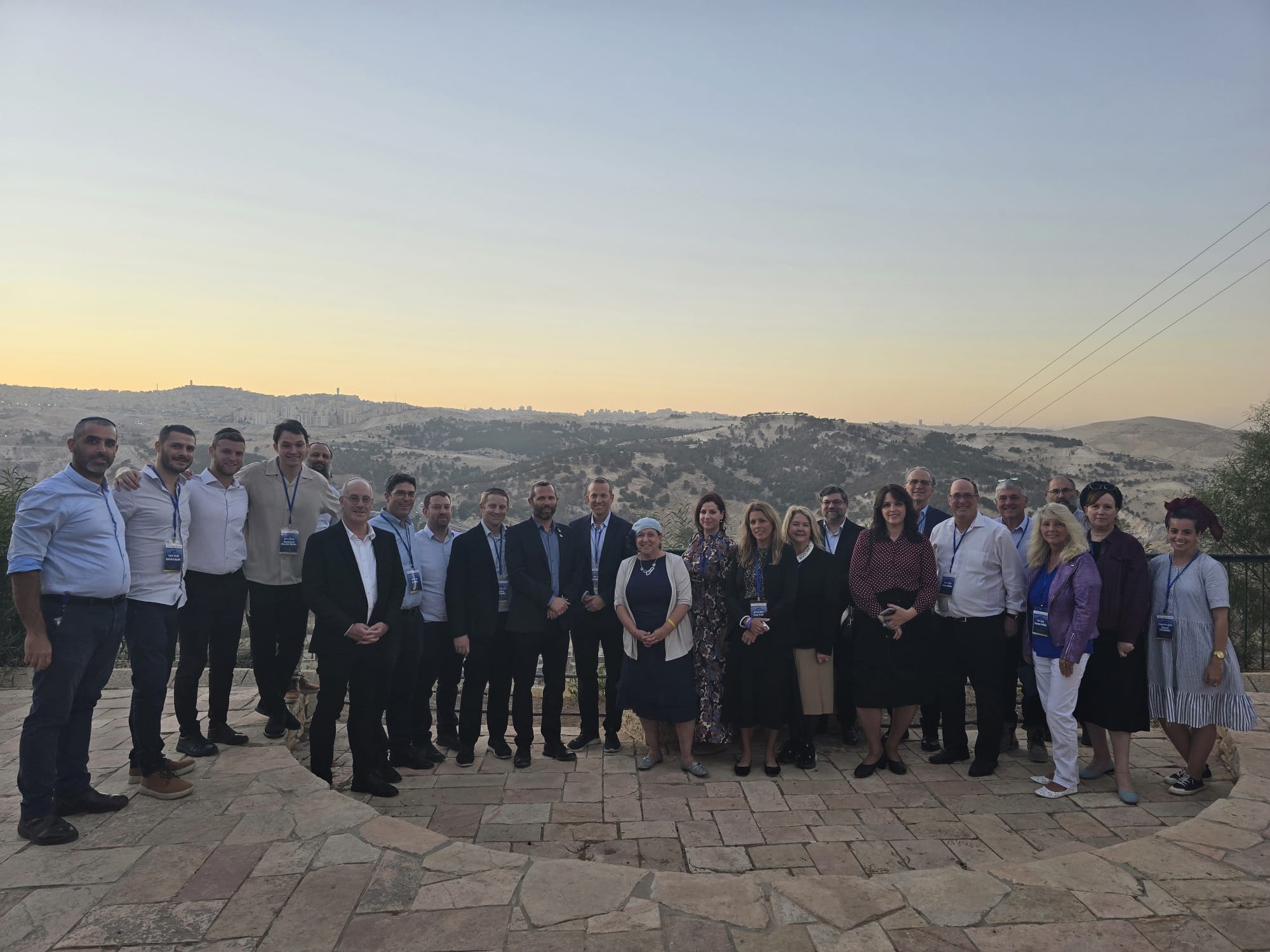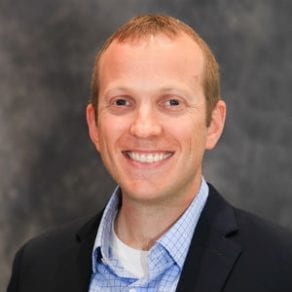As Israel365 Action prepared to make its debut at the 39th World Zionist Congress, the organization’s delegation embarked on a week of intensive engagement with Israel’s political leadership and strategic territories—beginning with unprecedented access to the Knesset and a revealing tour of the E1 corridor.
Inside the Knesset: Meeting Israel’s Religious Zionist Leadership
The delegation consisted of Tila Falic Levi from Miami, Rachael Chevalier from Washington, DC, Bruce Jacobson from New York, and Irma Fralic from Philadelphia, along with others affiliated with Israel365 Action. The visit to the Knesset offered both historical context and contemporary policy insight, and the group had the chance to meet with Knesset speaker Amir Ohana from the Likud party.
After touring the iconic building that serves as the seat of Israeli democracy, the group held an extensive meeting with the entire leadership of the Religious Zionist Party—a faction that has emerged as a powerful voice in Israel’s current government.
The meeting included Finance Minister Bezalel Smotrich, one of the most influential figures in the current coalition and a leading advocate for settlement development and sovereignty. Smotrich, who also serves as a minister within the Defense Ministry with authority over civilian affairs in Judea and Samaria, has been at the forefront of policies supporting Jewish communities in these territories.
Also present was Party Head MK Ohad Tal and Minister Orit Strook, who has championed settlement expansion and opposed the establishment of a Palestinian state. The delegation engaged with MK Simcha Rothman, chairman of the Knesset Constitution, Law and Justice Committee and a key figure in Israel’s judicial reform debates, as well as MKs Michal Waldiger, Moshe Solomon, and Zvi Sukkot—all representing different facets of the Religious Zionist Party’s vision for Israel’s future.
For the Israel365 Action delegation, these meetings provided direct insight into the thinking of Israeli lawmakers who share many of the organization’s core principles regarding sovereignty and settlement development. The conversations underscored the significant alignment between Israel365 Action’s platform and the positions held by a substantial portion of Israel’s elected leadership—a contrast that would become even more apparent during the subsequent World Zionist Congress debates.

E1: Understanding a Strategic Imperative
Following the Knesset meetings, the delegation traveled to E1, a strategically critical area east of Jerusalem, for a field tour led by Yisrael Gantz, head of the Yesha Council. The Yesha Council serves as the umbrella organization representing Jewish communities in Judea and Samaria, making Gantz an authoritative voice on settlement policy and development.
E1, short for “East 1,” refers to a corridor of land connecting Jerusalem to the large Jewish community of Ma’ale Adumim. The area has been at the center of intense international diplomatic pressure for decades, with opponents arguing that development there would impede the possibility of a contiguous Palestinian state. Proponents, however, view E1 as essential for ensuring Jerusalem’s security and maintaining territorial continuity for Israel’s capital.
The recent Israeli decision to move forward with construction in E1 represents a significant policy shift, one that Israel365 Action views as a necessary step toward strengthening Jewish presence surrounding Jerusalem. During the tour, Gantz explained the strategic importance of the area, pointing out how development in E1 would create an unbroken chain of Jewish communities from Jerusalem eastward, while also addressing critical housing needs for Israel’s growing population.
The delegation examined the topography of the region, gaining a firsthand understanding of how the territory overlooks key approaches to Jerusalem and serves as a natural buffer for the capital. Gantz detailed the history of the area, the legal status of the land, and the practical implications of building there—not just for security, but for the viability of Jewish communities in the region.

For many in the delegation, the visit to E1 crystallized the disconnect between Israeli policy priorities and the perspectives of much of the international Zionist movement. While Israeli leaders and settlement advocates view E1 development as a strategic and moral necessity, many Diaspora Zionists remain committed to frameworks that would preclude such construction.
The World Zionist Congress
These preparatory visits took place in the days leading up to the 39th World Zionist Congress, the supreme ideological and policy-making body of the World Zionist Organization. The Congress convenes once every five years in Jerusalem and brings together over 2,000 Zionist activists from around the world, including 750 delegates and twice as many alternates. This gathering represents the entire political and religious spectrum of the Zionist movement.
Approximately 42% of the delegates represent Zionist World Unions and are elected through Zionist Federations in over 30 countries, making the Zionist Congress by far the largest and most widespread democratic exercise in the Jewish world today. A further 25% represent Israel’s Zionist political parties, proportional to their representation in the Knesset. The remaining delegates represent 11 international Zionist organizations.
Together, the delegates and the bodies they form at the Congress determine the leadership and influence the policies of Israel’s National Institutions: the World Zionist Organization, the Jewish Agency for Israel, Keren Kayemeth LeIsrael, and Keren Hayesod.
Bridging the Gap
The contrast between the Israel365 Action delegation’s experiences at the Knesset and E1 and the subsequent debates at the World Zionist Congress highlighted a fundamental challenge facing the Zionist movement today. While Israeli elected officials and settlement leaders speak with confidence about sovereignty and strategic development, the international Zionist movement remains divided on these issues.
“The visits to the Knesset and E1 reinforced for us the urgency of the work we’re doing,” said Rabbi Tuly Weisz, founder of Israel365 Action. “When you see the conviction of Israel’s leaders and understand the strategic realities on the ground, and then you witness the resistance to these same principles at the World Zionist Congress, you realize how much education and bridge-building is needed within the Zionist movement.”
For Israel365 Action, the week’s activities—from the halls of the Knesset to the hills of E1 to the debates of the World Zionist Congress—served as both an introduction to the global Zionist arena and a call to action. The organization emerged from the experience with a clearer understanding of the gap it seeks to bridge and the work that lies ahead.





